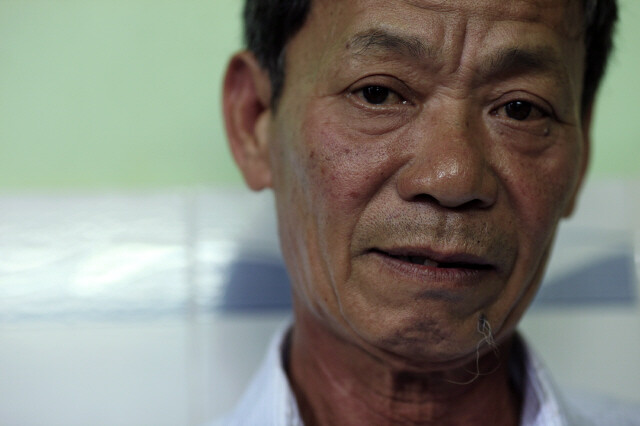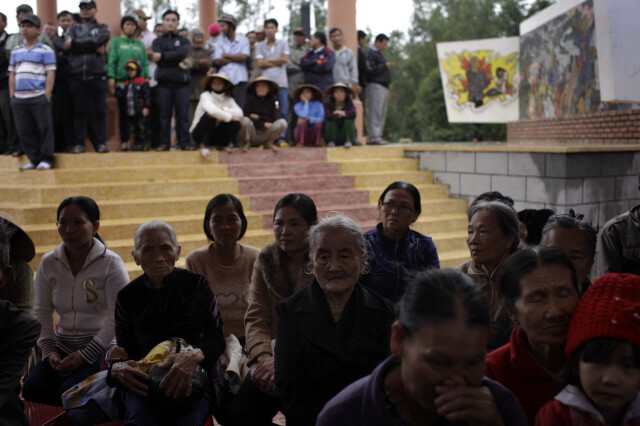hankyoreh
Links to other country sites 다른 나라 사이트 링크
[Reportage part I] S. Koreans apologize on 50th anniversary of Vietnam War massacres

During the Vietnam War, South Korean troops reportedly committed around 80 civilian massacres in which approximately 9,000 Vietnamese were killed. One of the worst of these was the Binh An Massacre.
Nguyen Tan Lan, a survivor of this massacre, delivered a speech at a memorial service held on the massacre’s 50th anniversary in Go Dai, a village in the rural commune of Tay Vinh (formerly Binh An) in Binh Dinh Province, in central Vietnam.
“I would like the South Korean government to take responsibility for what happened,” Nguyen said.
It was here in Tay Vinh, fifty years ago this February, that South Korean troops massacred 1,004 Vietnamese civilians over the course of three weeks. During that series of events, known as the Binh An massacre, Nguyen lost his mother and his younger sister. He was 15 years old at the time.
When Nguyen visited South Korea on the invitation of the Peace Museum in April of last year, he had an encounter with South Korean army veterans. The veterans accused Nguyen of being a liar, and he vowed on that day to never return.
The service at Tay Vinh marks the first of several 50th anniversary services that were held this year in Central Vietnam to comfort the spirits of those who were killed in the massacres. Most of the civilian massacres carried out by South Korean troops in Vietnam took place in 1966. Even though fifty years have passed, the truth remains hidden, and the victims of those massacres continue to suffer.
I joined a South Korean peace delegation that traveled to Vietnam to attend the 50th anniversary memorial for the Binh An massacre.
In Vietnamese, “phai chiu trach nhiem” means “you must take responsibility.”
The first time I met Nguyen was in South Korea in Apr. 2014. I quietly followed him during his weeklong visit to the country. It was during this visit that he met South Korean veterans of the Vietnam War.
The experiences Nguyen had during his trip to South Korea helped him to make a new resolution. Fifty years had passed since the death of his mother and younger sister. At home, Nguyen, a survivor of the Binh An massacre, spoke out, calling on the South Korean government to take responsibility for the massacre.
The members of the South Korean delegation who attended the memorial service asked Nguyen and other Vietnamese for their forgiveness. I wondered how the Vietnamese would take the apologies.

All eyes on South Korean delegation
It was the afternoon of Feb. 26, while an opposition filibuster against anti-terror legislation was under way in South Korea’s National Assembly. Dozens of motorcycles were parked all along the road to the Binh An massacre memorial altar in Go Dai, a village in the xa (township) of Tay Vinh in central Vietnam‘s Binh Dinh Province. The previous day, there had been a “Dai Han” ceremony honoring civilians massacred by South Korean forces during the Vietnam War (“Dai Han” is the Vietnamese word for South Korean soldiers). Today, even more people were gathered around the altar - easily in the hundreds, it appeared. On special days like fiftieth anniversary, Vietnamese provinces organize memorial ceremonies, explained delegation leader Ku Su-jeong, 50, who as a contributing writer to Hankyoreh 21 magazine brought the massacres to the public’s attention through a series of articles.
At the altar’s entrance was a large tent and a stage. A preliminary singing and dance performance was under way. Solemn music - reminiscent of military or protest songs - flowed from speakers on either side of the stage. As with any gathering, people loitered on the periphery snacking and selling children’s toys.
A full bow eases tensions
The Peace Delegation visiting Vietnam for a six-day trip on Feb. 24 included 32 members. Most were from the committee for a South Korea-Vietnam peace foundation; others had formed their own relationships with Vietnam over the years. Led by the Vietnamese social enterprise A-MAP (of which Ku is a South Korean partner and facilitator), the group descended from their 45-person bus and headed for the altar, carrying 15 wreaths sent by different South Korean groups and individual supporters. Ribbons on the wreaths bore different names: “Gwangju Sophia School,” “iCOOP Hanbat,” “Alliance of Citizens Concerned about Vietnam and Korea”, “Hoa Binh Ribbon.”
Like on the day before, everyone‘s eyes turned to the approaching group. Conscious of being watched, the members laid the wreaths near the altar and walked to the tent to assume their places midway through the seats. It was like an island of 32 South Koreans in the middle of an all-Vietnamese crowd.
Exactly 50 years before, South Korean troops fighting in the Vietnam war massacred 1,004 civilians in the area. Today’s event was meant to appease their spirits. The visitors weren‘t perpetrators themselves, but they represented the same people. No welcome was likely. That may be why it was so hard to meet the sad gazes in the surrounding crowd - it was as though we were the guilty ones.
“Fifty years ago, South Choson soldiers gathered residents from this area. . . .”
Thus began the official memorial ceremony. The officiant’s words were interpreted only in part and shared very carefully to avoid disturbing the surrounding Vietnamese attendees. South Korea was referred to by the name “South Choson.” Next came an introduction of guests and a memorial address by the vice-president of the Binh Dinh Province people‘s committee. Soon afterwards, massacre survivor Nguyen Tan Lan, 65, came to the stage. On Feb. 15, 1966, Nguyen lost his mother and younger sister in a massacre in the village of Can Phum in Binh An (now Tay Vinh). He was fifteen at the time. He had had to watch helplessly nearby as each died - first his sister, then his mother. He lost consciousness, and when he awoke he was alone in the world.
“Everything just seemed so hopeless at that moment. I just kept crying and calling for my mom,” he recalled.
The audience grew solemn. Faces darkened. Tears began to flow all around. Sniffling echoed from behind us, but I couldn’t turn around. As a South Korean, I was afraid to meet their eyes.
Unexpectedly, Nguyen finished his account by saying he “want[s] the South Korean government to take responsibility for this.” In the past, the Vietnamese government has stressed to its people the importance of “closing the door on the past and opening the future.” Part of that past was the misdeeds of South Korean forces, the second-largest number of troops in the conflict after the US‘s. This May, Barack Obama is scheduled to visit Vietnam for a second time, a first for a sitting US President. Hanoi has many futures to open up - and Nguyen’s wish runs counter to its policies. Is Seoul likely to hear of it?
Next after Nguyen came a speech by a Binh Dinh Province youth representative. After that, the name of the Peace Travel Group leader, 63-year-old Asia Fair Trade Network chairperson Roh Hwa-wook, was called. As Tay Vinh officials and residents looked on, Roh proceeded to the front of the stage to read a memorial address.
“Esteemed representatives, and ladies and gentlemen of the public!” Roh spoke in Korean, each sentence punctuated by an interpreter’s translation. Instantly a hush fell. “Xin loi!” he said, using the Vietnamese words for “I apologize.” “It’s taken so long. I’ve come to finally bring flowers of apology.”
The audience members fixed their eyes on the stage, their arms folded and faces somber.
“South Korea also has experiences with colonial rule, division, and war. We also bear the pain of civilian massacres by the US and by our own people,” Roh continued.
“It is with that history that South Korea has sown the seeds of the same anguish in Vietnam. It is shameful,” he added.
“I wish to offer a full bow for these unjust deaths. May they rest in peace!” he finished.
Roh proceeded to the middle of the stage, where he prostrated himself in a full bow. The audience remained silent. The members looked around, some smiling, some expressionless, some solemn. The person who had begun sniffling during Nguyen’s speech continued to cry. From the midst of these unfathomable, complex expressions, quiet applause rose up. The group leader returned to his seat as the moment of tension passed.
Continued in parts II and III
By Park Ki-yong, staff reporter in Vietnam
Please direct questions or comments to [english@hani.co.kr]

Editorial・opinion
![[Column] Park Geun-hye déjà vu in Yoon Suk-yeol [Column] Park Geun-hye déjà vu in Yoon Suk-yeol](https://flexible.img.hani.co.kr/flexible/normal/500/300/imgdb/original/2024/0424/651713945113788.jpg) [Column] Park Geun-hye déjà vu in Yoon Suk-yeol
[Column] Park Geun-hye déjà vu in Yoon Suk-yeol![[Editorial] New weight of N. Korea’s nuclear threats makes dialogue all the more urgent [Editorial] New weight of N. Korea’s nuclear threats makes dialogue all the more urgent](https://flexible.img.hani.co.kr/flexible/normal/500/300/imgdb/original/2024/0424/7317139454662664.jpg) [Editorial] New weight of N. Korea’s nuclear threats makes dialogue all the more urgent
[Editorial] New weight of N. Korea’s nuclear threats makes dialogue all the more urgent- [Guest essay] The real reason Korea’s new right wants to dub Rhee a founding father
- [Column] ‘Choson’: Is it time we start referring to N. Korea in its own terms?
- [Editorial] Japan’s rewriting of history with Korea has gone too far
- [Column] The president’s questionable capacity for dialogue
- [Column] Are chaebol firms just pizza pies for families to divvy up as they please?
- [Column] Has Korea, too, crossed the Rubicon on China?
- [Correspondent’s column] In Japan’s alliance with US, echoes of its past alliances with UK
- [Editorial] Does Yoon think the Korean public is wrong?
Most viewed articles
- 1[Column] Park Geun-hye déjà vu in Yoon Suk-yeol
- 2Will NewJeans end up collateral damage in internal feud at K-pop juggernaut Hybe?
- 3Thursday to mark start of resignations by senior doctors amid standoff with government
- 4Why Korea shouldn’t welcome Japan’s newly beefed up defense cooperation with US
- 5‘We must say no’: Seoul defense chief on Korean, USFK involvement in hypothetical Taiwan crisis
- 6[Guest essay] The real reason Korea’s new right wants to dub Rhee a founding father
- 7N. Korean hackers breached 10 defense contractors in South for months, police say
- 8[Column] ‘Choson’: Is it time we start referring to N. Korea in its own terms?
- 9[Editorial] New weight of N. Korea’s nuclear threats makes dialogue all the more urgent
- 10Kim Jong-un expressed ‘satisfaction’ with nuclear counterstrike drill directed at South